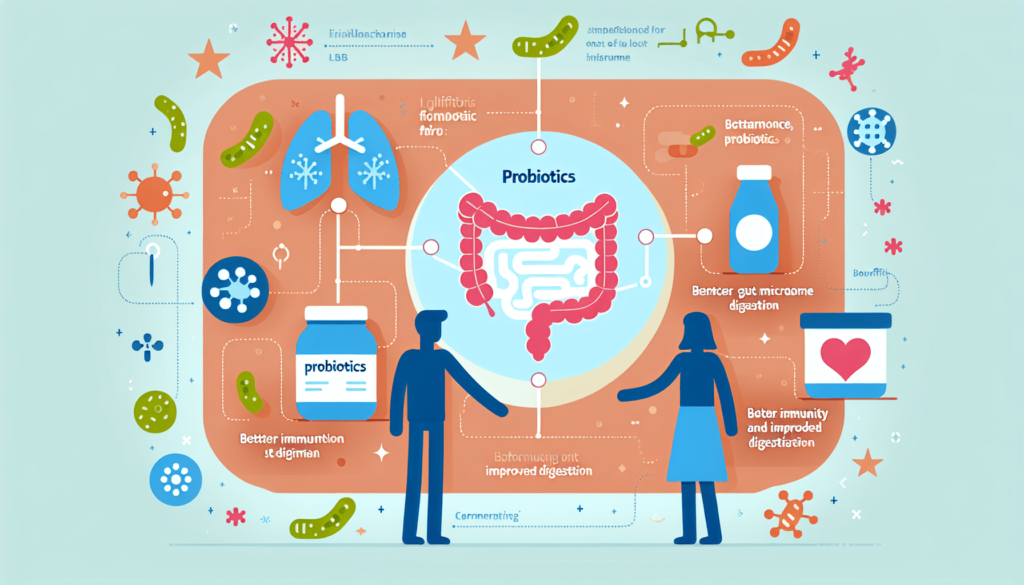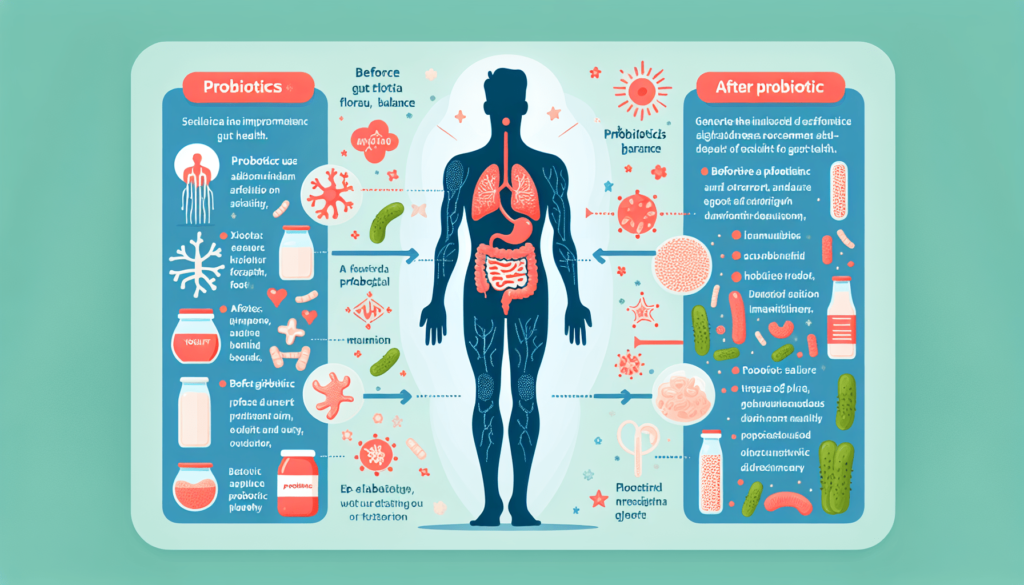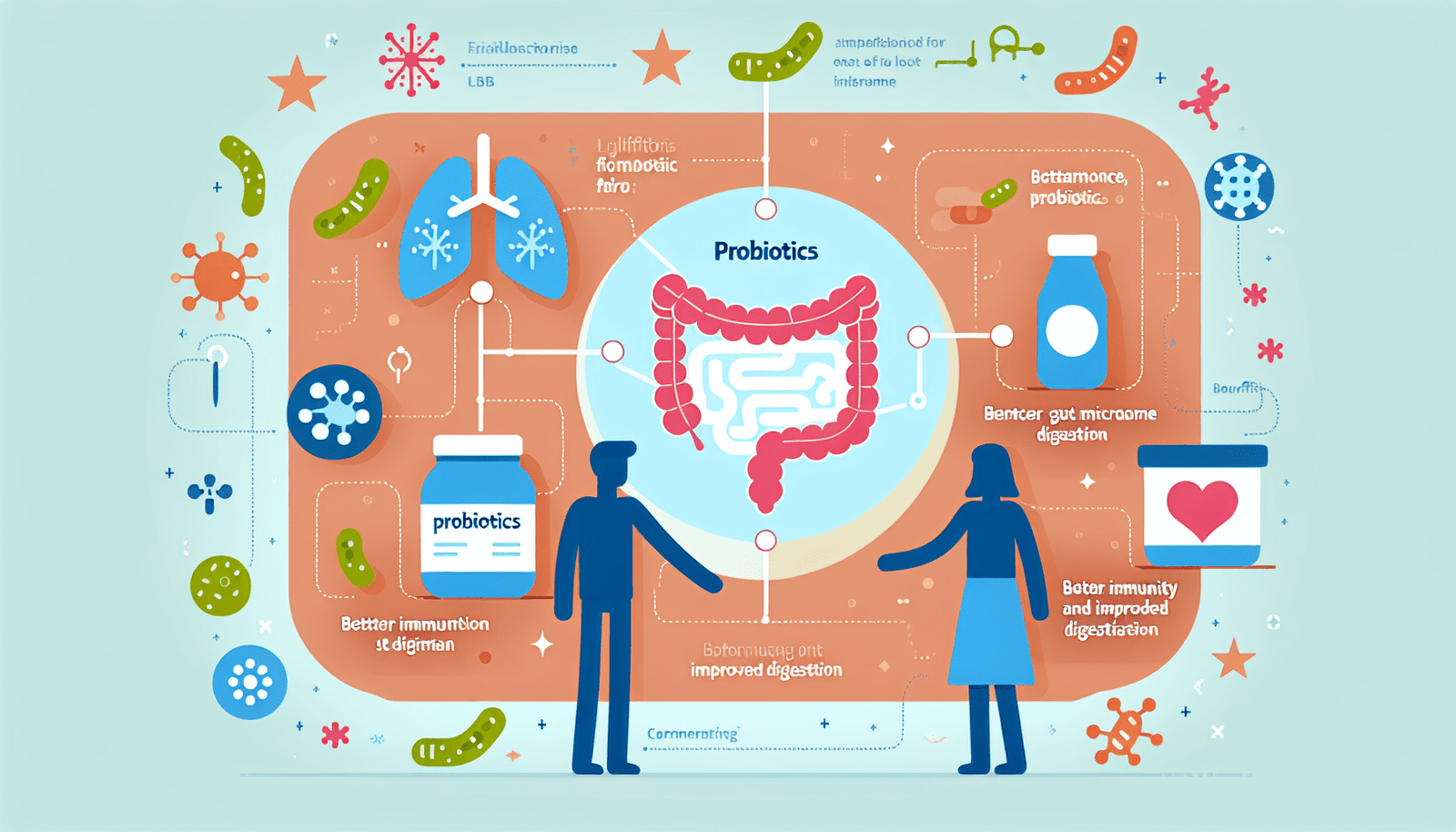Maintaining a healthy gut is essential for overall well-being, and one way to achieve this is through the power of probiotics. Probiotics, often referred to as “good bacteria,” play a vital role in balancing the gut flora and promoting digestive health. By introducing these beneficial microorganisms into your system, you can improve digestion, boost immunity, and even enhance mental well-being. In this article, we will explore the incredible benefits of probiotics and how they can help you achieve a harmonious gut flora for a healthier and happier life.

What are probiotics?
Probiotics are live bacteria and yeasts that are beneficial for your overall health, particularly for your digestive system. They can be found in various food sources and are also available in supplement form. These “good bacteria” are similar to the natural microorganisms that reside in your gut and play a vital role in maintaining a healthy balance of gut flora.
Definition of probiotics
Probiotics refer to the live microorganisms that, when consumed in adequate amounts, offer health benefits to the host. These microorganisms can be bacteria, such as Lactobacillus and Bifidobacterium species, or yeasts like Saccharomyces boulardii. They are capable of surviving the harsh environment of the gastrointestinal tract and colonizing the gut, where they exert their beneficial effects.
Types of probiotics
Probiotics can be classified into various types based on their strain and species. Some commonly used probiotic strains include Lactobacillus acidophilus, Lactobacillus casei, Bifidobacterium bifidum, and Streptococcus thermophilus. Each strain possesses unique characteristics and benefits, making it important to select the right probiotics for your specific needs.
Sources of probiotics
Probiotics can be obtained from both natural food sources and supplements. Foods like yogurt, kefir, sauerkraut, kimchi, and other fermented foods can serve as excellent sources of probiotics. Additionally, probiotic supplements are available in the form of capsules, powders, and drinks, providing a convenient option for those who may not consume enough probiotic-rich foods.
The importance of gut flora
Your gut flora, also referred to as gut microbiota, consists of trillions of microorganisms residing in your digestive system. Maintaining a healthy balance of gut flora is crucial for various aspects of your health, from digestion to immune function.
Role of gut flora in digestion
Gut flora helps break down and digest food, enabling the absorption of essential nutrients from your diet. They produce enzymes that aid in the digestion of complex carbohydrates, proteins, and fats. Additionally, certain gut bacteria play a role in producing vitamins, such as vitamin K and some B vitamins, which are indispensable for your overall health.
Impact of gut flora on overall health
The well-being of your gut flora is not limited to digestion alone. It has a profound impact on your overall health. A healthy gut flora helps maintain an optimal gut barrier function, preventing the entry of harmful pathogens into your body. It also plays a crucial role in modulating your immune system, influencing factors like inflammation and allergic responses. Furthermore, recent research suggests a link between imbalanced gut flora and various health conditions, including obesity, diabetes, and even mental health disorders.
Ways to maintain a healthy gut flora
To support a healthy gut flora, it is essential to adopt certain lifestyle habits. A balanced diet that includes fiber-rich foods, prebiotics, and probiotics is crucial. Regular exercise, stress management, and adequate sleep also contribute to a healthy gut flora. Avoiding excessive use of antibiotics, which can disrupt the delicate balance of gut bacteria, is vital. Additionally, minimizing the consumption of processed foods, sugar, and artificial sweeteners can help maintain a diverse and robust gut microbiome.
How probiotics work
Probiotics exert their beneficial effects by interacting with your gut flora and modulating the immune system. They help restore and maintain a healthy balance of microorganisms in your gut.
Mechanism of action of probiotics
Probiotics reinforce the beneficial bacterial species in your gut by adhering to the gut wall and colonizing the intestinal tract. They compete with harmful bacteria for nutrients and space, thereby inhibiting their growth and preventing pathogenic overgrowth. Probiotics may also produce certain substances, such as short-chain fatty acids, which have anti-inflammatory and protective effects on the gut lining.
Effects of probiotics on gut flora
Probiotics can promote the growth of beneficial bacteria in your gut, such as Bifidobacteria and Lactobacilli. By creating an environment conducive to the growth of these friendly microorganisms, probiotics contribute to a healthy and diverse gut flora.
Interaction between probiotics and the immune system
Probiotics have immunomodulatory properties, meaning they can regulate the activity and responsiveness of your immune system. They can enhance the function of immune cells, such as T cells and natural killer cells, which play a crucial role in defending against pathogens. Probiotics also help maintain a balanced immune response, preventing excessive inflammation or inappropriate immune reactions.
Benefits of probiotics
Probiotics offer a range of benefits for your overall health, particularly in terms of digestion, immune function, and management of gastrointestinal conditions.
Improved digestion and nutrient absorption
Probiotics aid in the breakdown and digestion of food, helping your body extract essential nutrients. They can increase the production of digestive enzymes and promote the absorption of nutrients in the intestines. This can result in improved digestion, reduced bloating, and better overall gut health.
Enhanced immune function
A healthy gut flora is closely intertwined with your immune system. Probiotics support the development and function of immune cells, promoting a robust immune response. By enhancing immune function, probiotics can help reduce the risk of infections, allergies, and other immune-related conditions.
Management of gastrointestinal conditions
Probiotics have shown promising results in managing various gastrointestinal conditions. They can alleviate symptoms associated with irritable bowel syndrome (IBS), such as abdominal pain, bloating, and irregular bowel movements. Probiotics may also be beneficial in reducing the severity and duration of diarrhea, whether it is caused by infections or antibiotics.

Choosing the right probiotics
With numerous probiotic products available, selecting the right one can be a daunting task. Consider the following factors to make an informed decision.
Considerations when selecting probiotic supplements
When choosing probiotic supplements, look for products that provide sufficient colony-forming units (CFUs) of the desired probiotic strains. Ensure the product has been tested for safety and efficacy through rigorous quality control and clinical studies. It may also be beneficial to opt for products that contain multiple strains of probiotics for a broader range of health benefits.
Prebiotics and synbiotics
Prebiotics are non-digestible fibers that serve as food for probiotics, promoting their growth and activity in the gut. Synbiotics refer to products that combine probiotics and prebiotics, creating a synergistic effect. Consider incorporating prebiotic-rich foods, such as garlic, onions, and bananas, into your diet along with probiotics for maximum benefit.
Probiotic strains for specific health concerns
Different probiotic strains may have varying effects on specific health concerns. For example, Lactobacillus rhamnosus GG has been studied extensively for its potential benefits in managing diarrhea, while Bifidobacterium longum has shown promise in improving symptoms associated with lactose intolerance. It is crucial to identify the probiotic strains that align with your specific health concerns for optimal results.
Incorporating probiotics into your diet
Probiotics can be obtained through both food sources and supplements. Including probiotic-rich foods and fermented foods in your diet can be an effective way to maintain a healthy gut flora.
Probiotic-rich foods
Yogurt is one of the most familiar probiotic-rich foods, containing live cultures of beneficial bacteria. Kefir, a fermented milk drink, is another excellent source of probiotics. Other probiotic-rich foods include sauerkraut, kimchi, tempeh, and miso. Including these foods in your diet can help introduce diverse strains of probiotics into your gut.
Fermented foods
Apart from probiotic-rich foods, various fermented foods offer additional health benefits. Fermentation involves the breakdown of carbohydrates by microorganisms, resulting in the production of beneficial substances like organic acids and enzymes. Examples of fermented foods include kombucha, sourdough bread, pickles, and kefir. These foods not only provide probiotics but also offer potential digestive and immune system benefits.
Using probiotic supplements
For those who may not consume enough probiotic-rich foods, supplements can be a convenient option. Probiotic supplements are available in various forms, such as capsules, powders, and drinks. When choosing a probiotic supplement, ensure that it contains the desired strains and has adequate CFUs. Follow the recommended dosage and consult a healthcare professional if you have any underlying health conditions or concerns.
Probiotics and specific health conditions
Probiotics have shown promise in managing various health conditions, particularly those related to the gut, immune system, and even mental health.
Probiotics for gut disorders
Probiotics have been extensively studied for their potential benefits in managing and preventing gut disorders. They can be beneficial in reducing symptoms associated with irritable bowel syndrome (IBS), such as abdominal pain, bloating, and altered bowel movements. Some studies suggest that certain probiotic strains may also help manage inflammatory bowel diseases (IBD) like ulcerative colitis and Crohn’s disease.
Probiotics for immune-related conditions
A healthy gut flora plays a pivotal role in modulating your immune system. Probiotics can enhance immune function and help reduce the risk of infections and allergies. Some studies suggest that probiotics may help manage respiratory tract infections, such as the common cold and influenza. They may also have a role in managing autoimmune conditions by regulating immune responses.
Probiotics for mental health
Emerging research indicates a potential link between gut health and mental health. The gut-brain axis, a bidirectional communication system between the gut and the brain, plays a significant role in mental well-being. Probiotics may exert positive effects on mental health conditions like anxiety, depression, and stress. While more research is needed in this area, early findings are promising.
Side effects and precautions
While probiotics are generally safe for most individuals, some potential side effects and precautions should be considered.
Potential side effects of probiotics
In most cases, probiotics are well-tolerated and do not cause any adverse effects. However, some individuals may experience mild digestive symptoms, such as bloating, gas, or diarrhea, especially when first starting probiotic supplementation. These symptoms often resolve on their own as your gut adjusts to the new microorganisms.
Precautions when using probiotics
While probiotics are safe for most people, certain individuals with weakened immune systems or underlying health conditions need to exercise caution. If you have a compromised immune system, are critically ill, or have undergone recent surgery, consult a healthcare professional before starting probiotics. Additionally, pregnant and breastfeeding women should seek medical advice before adding probiotic supplements to their routine.
Consulting a healthcare professional
If you have any concerns or questions regarding probiotics, it is always advisable to consult a healthcare professional. They can provide personalized recommendations based on your specific health needs and guide you towards the most suitable probiotic products.
Probiotics for different age groups
Probiotic needs may vary depending on age and life stage. Here are some considerations for different age groups.
Probiotics for infants and children
Probiotics can be beneficial for infants and children, particularly in reducing the incidence and duration of certain infections and digestive issues. Probiotics can be given to infants as recommended by a healthcare professional, such as for the prevention or management of colic, diarrhea, or eczema. In children, probiotics may help boost the immune system and support overall gut health.
Probiotics for adults
Adults can benefit from probiotics in terms of improving digestion, immune function, and maintaining a healthy gut flora. Probiotics may be particularly beneficial during or after a course of antibiotics to restore the balance of gut bacteria. Additionally, adults with specific health concerns, such as IBS or gastrointestinal conditions, may find probiotics helpful in managing symptoms.
Probiotics for older adults
As we age, our gut flora composition may change, and the overall diversity of microorganisms may decrease. Probiotics can play a role in supporting the gut health of older adults. They may help alleviate digestive issues, enhance nutrient absorption, and provide immune support. Older adults should consult a healthcare professional before starting any new supplements, including probiotics, to ensure they are suitable for their individual needs.
Future potential of probiotics
The field of probiotics is constantly evolving, and ongoing research aims to explore new applications and advancements in this area.
Research and advancements in probiotics
Researchers continue to investigate the potential benefits of probiotics in various health conditions. Studies are underway to evaluate the effects of specific probiotic strains in managing conditions like diabetes, cardiovascular health, mental health disorders, and more. The growing understanding of the gut-brain axis and the intricate communication between the gut and other body systems opens up new avenues for future research.
Exploring new applications of probiotics
Probiotics have predominantly been associated with gut health, but their potential applications extend beyond the digestive system. Researchers are exploring the use of probiotics in skin health, oral health, vaginal health, and even in managing metabolic disorders. The emerging field of personalized nutrition and microbiome analysis may further enhance our understanding and utilization of probiotics in tailored health interventions.
Potential challenges and limitations
Although probiotics offer numerous benefits, there are still challenges and limitations that need to be addressed. The lack of regulation and standardized dosing for probiotic supplements make it crucial to choose reputable brands and products. Probiotics may not work the same way for everyone, and individual responses can vary. It is essential to consider the strain, dosage, and individual health needs when incorporating probiotics into your routine.
In conclusion, probiotics are powerful allies in maintaining a healthy balance of gut flora and promoting overall health. These beneficial bacteria and yeasts offer multiple benefits, from improved digestion and enhanced immune function to managing specific health conditions. By understanding how probiotics work, choosing the right supplements, and incorporating probiotic-rich foods into your diet, you can optimize your gut health and support your well-being. As probiotic research continues to expand, the future potential of these microorganisms appears promising, with new applications and advancements on the horizon. Remember to consult a healthcare professional for personalized advice and to ensure probiotics are suitable for your specific needs. Start harnessing the power of probiotics and unlock the benefits for a healthier you.

